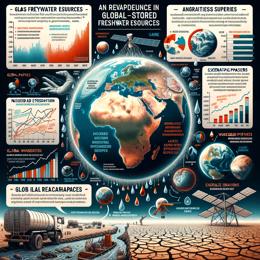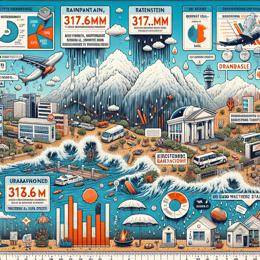Picture: for illustration purposes
The West’s Climatic Woes Put the Global South’s Climate Funding in Jeopardy
As the inevitable impact of global warming becomes more manifest across the planet, an impending climate-focused transformation in international investment and lending could detrimentally impact the economically disadvantaged Global South. Prior to 2021, climate change and its debilitating effects were commonly recognised as issues that disproportionately infringed on regions within the Global South. It was, therefore, commonplace for international financiers and well-established economies to allocate significant portions of their climate-bound funds and investments towards these vulnerable regions, to boost their resilience and climate adaptation capacity.
Nevertheless, a substantial shift has occurred over the past two years, particularly heightened in 2023. Extensive heatwaves, violent storms, lethal hurricanes and wildfires have besieged developed countries across North America, Europe, the Middle East and East Asia. Consequently, this may direct rich countries to reallocate their climate funding initially set aside for the Global South towards their own recovery.
It's already apparent that climate-induced shifts are impacting funding mechanisms such as multilateral climate funds. The Green Climate Fund's struggles to secure pledges for its next funding cycle from wealthy countries is a case in point. These funding platforms, although challenging to access, have provided the Global South with a lifeline in the fight against climate change. However, if funds dwindle, the repercussions could be devastating. The newly established Loss and Damage Fund is already feeling the sting of austerity.
Given that global debt institutions like the International Monetary Fund (IMF) and the World Bank increasingly recognise climate exposures within their lending systems, this serves to extend further uncertainty for the Global South. With increasing climate-induced disasters and global inflation, the likelihood of loan defaults is on the rise.
The narrative of Pakistan, for instance, epitomises this predicament. Despite being rescued from a potential economic collapse by an IMF-approved $3bn loan following severe flooding, stringent bailout terms have led to significant inflation and depreciation of the Pakistani rupee. A similar story is unfolding within Africa, with 13 nations teetering on the brink of climate-induced debt distress.
In response to the looming crisis, sustainable adjustments within the financial system are urgently needed, advocating for more equitable opportunities based on collective sympathy, understanding, and support for the imperiled Global South.










